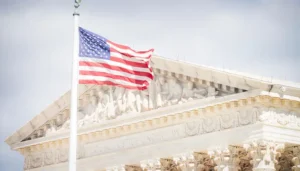 WASHINGTON — The U.S. Supreme Court delivered a major 6-3 victory June 27 in Mahmoud v. Taylor, ruling that parents have a First Amendment right to exercise their religious beliefs and should have the ability to opt their children out of public-school curriculum promoting radical gender ideology.
WASHINGTON — The U.S. Supreme Court delivered a major 6-3 victory June 27 in Mahmoud v. Taylor, ruling that parents have a First Amendment right to exercise their religious beliefs and should have the ability to opt their children out of public-school curriculum promoting radical gender ideology.
The decision represents a significant win for religious liberty advocates and parental rights groups who challenged a Montgomery County, Maryland school policy that required elementary students to use specific storybooks without parental consent or notification.
“I’m encouraged by the Court’s ruling today to protect the rights of parents to raise their children according to their deeply held convictions, even as they are educated in public schools,” said Brent Leatherwood, president of the Ethics & Religious Liberty Commission (ERLC) of the Southern Baptist Convention.
“As the primary teachers of their home, parents should have the right to opt their children out of curriculum that actively undermines their religious convictions regarding marriage, family, gender, and sexuality. Religious families should be accommodated so that parents do not have to worry that their children will be indoctrinated in an educational setting.”
The Montgomery County Challenge
The Supreme Court case originated from a policy instituted by the Montgomery County Board of Education in Maryland, which mandated the use of storybooks in elementary school classrooms that promote gender ideology and sexuality inclusivity without parental consent or prior notification.
A multifaith coalition of more than 300 religious parents, including Muslims, Catholics, Protestants, and Orthodox Christians, challenged this policy in court with the help of the Becket Fund for Religious Liberty.
The parent coalition argued that the school district’s policy violated their constitutional rights in multiple ways:
- Parental Rights: Under Supreme Court precedent, parents have a fundamental right to direct the education and upbringing of their children, including shielding them from teachings that contradict their deeply held religious beliefs.
- Religious Liberty: The school’s policy places an unconstitutional burden on parents, forcing them to either accept teachings that violate their faith or choose to remove their children from public school altogether.
- Free Speech and Free Exercise: The refusal to accommodate religious opt-outs violates the Free Exercise Clause of the First Amendment.
Legal Support and Background
The ERLC filed a brief urging the Supreme Court to protect parental rights and uphold religious liberty, arguing that public schools should not have the power to impose ideological viewpoints on children against their parents’ wishes. The brief emphasized that parents — not school officials — are the primary educators of their children and must be free to guide their moral and religious development.
The decision aligns with positions taken by Southern Baptists at their 2024 Annual Meeting, where messengers passed a resolution “On the God-Given Rights and Responsibilities of Parents.”
The resolution called for the state to ensure “that parents have the freedom to make decisions regarding the upbringing, education, and healthcare of their children without undue interference, recognizing that parents are the primary arbiters of a child’s moral and spiritual formation.”

